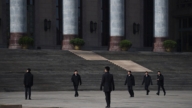【新唐人2014年07月30日訊】總部位於美國的跨國電腦科技公司「微軟」,在北京、上海、廣州、成都的辦公室,7月28號遭到中共國家工商總局的突擊調查,29號,工商總局宣佈,已對「微軟公司」所謂「涉嫌壟斷」行為立案調查。分析指出,杜絕企業壟斷,應針對央企進行調查,中共企圖讓國際大公司聽命於它,而使用各種威脅利誘手段。
據大陸《新浪科技》網站報導,28號上午,有大批工商總局人員進入「微軟」位於北京、上海、廣州、成都等四地分公司辦公室,他們查封資料、扣押2臺電腦,並向「微軟」員工進行問話。
28號晚間,「微軟中國」內部人士向《新浪科技》透露,這一次突擊調查,是因為有人向工商總局投訴,「微軟」違反了中國《反壟斷法》。這位人士表示,工商總局工作人員並沒有透露更多信息,也沒有說明投訴者是誰。
「微軟中國」隨後在一份簡短聲明中表示,會積極配合政府部門的調查。
29號,工商總局宣佈,已對「微軟公司」涉嫌壟斷行為立案調查。
旅美中國社會問題研究人士張健:「微軟公司被中國政府下令徹查的話,就是非常奇怪的事情,因為微軟對於全世界互聯網的幫助是有目共睹的。中國政府如果想清查的話,首先應該清查在中國大量充斥著盜版的微軟軟件,保護知識產權。」
業界人士判斷,「微軟」很可能遭到「濫用市場地位」的相關壟斷指控。據了解,今年4月,「微軟」不再為「XP操作系統」提供技術支持,導致大陸近2億臺電腦面臨安全風險,當時就有專家指出,「微軟」違反了《反壟斷法》的規定。
大陸企業顧問何軍樵:「它的壟斷行為還能比的過咱們的央企?能比的過中石化?還是能比的過中石油?還是能比的過中國電信?中國移動?我們的所謂世界500強企業,有幾家不是壟斷企業?所謂的反壟斷調查,可能只是一個藉口,應該更有可能是涉及到它所謂的安全問題。」
5月16號,中共當局規定,政府機關在採購招標中,針對所有電腦類產品,不准安裝「Windows 8作業系統」。外界指出,這項禁令與「Win8」不利國家資訊安全有關,「Win 8」允許用戶透過雲端共用內容,不僅容易導致政府資訊外洩,「微軟」對「Win 8」的控制力增強,也讓中共官方擔憂「難以管控內容」。
「微軟」是最新一家遭遇反壟斷調查的外資企業。在此之前,中共國家發改委曾針對世界上最大的手機芯片製造商「高通公司」發起反壟斷調查,「高通」被指控濫用市場支配地位非法牟利,而面臨超過10億美元的罰款。
旅居美國的中國社會問題研究人士張健指出,中共對「微軟公司」的查處,和去年對「蘋果公司」的批判如出一轍。
張健:「中共對大公司下手,不外乎幾個原因,第一,讓這些公司作為它的代言人,做它的幫兇,第二,讓這些公司通過它在本國的影響力,在國際舞臺上,繼續在幕後,從各個方面對中共政權進行支持,第三,用各種威脅利誘的手法,來綁架這些大公司,讓這些大公司在中國聽命於中共的調遣。」
去年3月,中共喉舌《央視》曾點名批評「蘋果公司」,《人民日報》也連續3天指責「蘋果公司」的售後服務實施所謂「中外雙重標準」。3月27號,《人民日報》更發表時評,批評「蘋果」。幾天後,「蘋果公司」主動刪除了「經典書」軟件,據了解,這款軟件可以讓大陸讀者看到被中共當局禁止的10本書。
去年7月,「蘋果公司」從應用程式發佈平臺「App Store」,移除手機翻牆軟件「Open Door」。11月,「蘋果」再次順從中共當局的要求,針對大陸用戶移除了「自由微博」(FreeWeibo)。
「微軟公司被調查」一事引發熱烈討論。有網友說,「國企笑了」,也有網友說,「全球最大的盜版市場,是哪來的這麼大底氣查人家」,還有網友說,「高通,微軟相繼被調查,下一個是誰?」
採訪/田淨 編輯/陳潔 後製/舒燦
China Conducts Anti-Trust Investigation Against Microsoft
Microsoft offices in Beijing, Shanghai, Guangzhou
and Chengdu were raided by China’s State Administration
for Industry and Commerce (SAIC) on July 28.
On July 29 SAIC announced its investigation
against Microsoft for alleged monopolistic practices.
Analysts pointed out that to prevent monopolistic practices,
the regime should have probed into its state-owned
enterprises instead.
But to force major international firms to follow its orders,
the Communist regime has used various approaches
such as coercion and temptations.
According to Sina Technology Website, a large number
of SAIC agents entered Microsoft’s offices located in Beijing,
Shanghai, Guangzhou and Chengdu on the morning
of July 28.
In addition to taking away various documents and two
computers, they also questioned Microsoft’s employees.
On the evening of July 28, Microsoft China’s personnel
revealed to Sina Technology Website that the sudden
and unannounced investigation this time was because
someone complained to SAIC that Microsoft was in violation
of China’s Anti-monopoly Law.
The source also said that SAIC agents did not disclose any
further information, nor explain who the complainant was.
Shortly afterward, in a brief statement Microsoft China
expressed that it would fully cooperate with the investigation
conducted by the authorities.
On July 29, SAIC announced that it has conducted an
investigation against Microsoft for its monopolistic practices.
Chinese social problem researcher Zhang Jian: “It is very
strange to conduct this thorough investigation against
Microsoft, as Microsoft’s contribution to the Internet
around the world is obvious.
If the regime really wants to do something, it should first
investigate its markets fraught with pirated Microsoft
software, so as to protect intellectual property rights."
People in the industry believe that Microsoft is very likely
to be accused on the charge of “abuse of dominant market
position" and other monopoly-related charges.
It was reported that Microsoft has no longer provided
technical support for its XP operating system since April
this year, leading to nearly 200 million computers in China
facing security risks.
Some experts pointed out at the time that Microsoft violated
the provision of China’s Anti-monopoly Law.
Chinese business consultant He Junqiao: “In terms
of monopolistic practices, China’s state-owned enterprises,
such as China National Petroleum Corporation,
China Telecom, China Mobile, have no rivals.
Among the so-called Fortune 500 businesses in China,
how many of them are not a monopoly enterprise?
The alleged antitrust investigation may simply be an excuse,
and it is very likely that the case is related to the so-called
security issues."
On May 16, the Chinese authorities ordered that Windows 8
operating system was not allowed to be installed
in all computer products among government procurement
bids.
It is believed that the ban has something to do with the fact
that Win8 is not good for China’s national information security.
Win 8 allows users to share information with others through
cloud.
Not only can it result in the leakage of government
information, but Microsoft’s greater control over its Win 8
also lead to Chinese officials’ worries about the “difficulties
in controlling information."
Microsoft is the latest foreign-funded enterprise that
encountered antitrust investigation.
Prior to that, the National Development
and Reform Commission have conducted an antitrust
investigation against the world’s largest mobile phone
chip maker, Qualcomm Incorporated.
Qualcomm was being accused of abusing of its market
dominance for illegal profits, and faced more
than one billion U.S. dollars of fines.
Zhang Jian pointed out that China’s investigation against
Microsoft is the same as its punishment against Apple last year.
Zhang Jian, “The reasons why China investigates
these major companies are nothing more than to
make these companies become its spokespersons
and accomplices;
Second, make these companies support China behind
the scenes of the international arena through their influence
in their own countries;
Thirdly, kidnap these big companies with a variety of threats
and inducements, so that they listen to China’s orders
when they are in China."
In March 2013, state media CCTV has criticized the Apple,
People’s Daily also accused Apple’s after-sale services has
different standard in China’ for 3 consecutive days.
On March 27, People’s Daily even posted an article
to criticize Apple.
A few days later, Apple took the initiative to delete
the ‘Classic Book’ app which allows Chinese readers
to see the ten books forbidden by China.
In July 2013, Apple removed the ‘Open Door’ from its
app release platform, ‘App Store.’
It is a software that breaks Internet blocks on mobile phone.
In November, Apple followed CCP’s order again,
and removed the free Weibo service for mainland users.
The investigation against Microsoft had caused a heated
discussion.
Some netizens wrote, ‘China Enterprises are smiling.’
Some other netizens stated, ‘Where did the world’s largest
piracy market get its courage to investigate Apple?’
There are also netizens questioned, ‘After Qualcomm
and Microsoft being investigated, who will be the next?’
Interview/TianJin Edit/ChenJie Post-Production/ShuCan

























